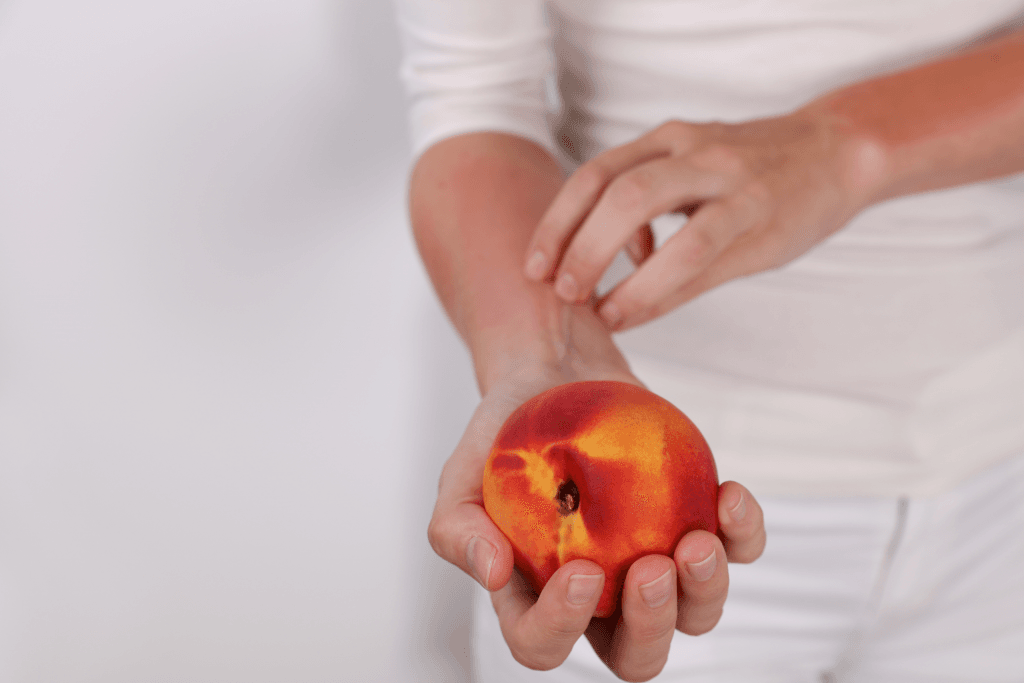
Home – Tests – Allergies and intolerances – Stone fruit allergy test
West Midlands
Stone Fruit Allergy Tests
A stone fruit allergy occurs when the immune system reacts to proteins found in fruits such as peaches, plums, cherries, apricots, and nectarines. This type of allergy can cause a range of symptoms, from mild discomfort like itching or swelling to severe, life-threatening reactions like anaphylaxis. For individuals with a stone fruit allergy, avoiding these fruits and being prepared for emergencies is essential.
Cost
- Focused GP appointment (15min) £75
- Standard GP appointment (30min) £120
What are the symptoms of a stone fruit allergy?
The symptoms of a stone fruit allergy can differ depending on how sensitive you are.
- Mild symptoms include itching or tingling in the mouth, lips, or throat, which is often related to something called Oral Allergy Syndrome (OAS). This happens when your body confuses proteins in the fruit with pollen proteins.
- Moderate symptoms might involve swelling of the face, lips, tongue, or throat, as well as hives or itching. This is known as angioedema and can be more uncomfortable but not life-threatening.
- Severe symptoms can be much more dangerous. These include difficulty breathing, wheezing, chest tightness, and sometimes nausea or dizziness. In the most serious cases, people can develop anaphylaxis, a life-threatening allergic reaction that needs immediate medical attention. If you experience any of these symptoms, using an adrenaline auto-injector (EpiPen) is crucial, and emergency services should be called.
What causes stone fruit allergies?
Stone fruit allergies are often triggered by specific proteins in the fruit. If you’re allergic to pollen, especially birch pollen, you may experience cross-reactivity, where your body reacts to similar proteins in fruits. This can cause mild symptoms like itching or tingling in the mouth.
For others, the reaction is more direct and linked to their immune system’s sensitivity to the proteins found in the fruit’s skin or flesh.
How do we diagnose a stone fruit allergy?
At OneMedicine, diagnosing a stone fruit allergy begins with a discussion of your symptoms and triggers, especially after eating certain fruits. To confirm the allergy, we may arrange a skin prick test, where a small amount of stone fruit extract is placed on your skin to see if it causes a reaction. If you’re allergic, a red, itchy bump will appear.
We may also suggest a blood test to check for specific antibodies your immune system produces in response to stone fruits, which can help confirm the diagnosis.
What we test for ?
The IgE blood test for stone fruits (apricot, cherry, plum, and peach) checks for allergen-specific IgE antibodies. Elevated levels indicate an allergy or sensitivity to these fruits, often causing oral allergy syndrome (itching, tingling). Since these fruits are in the same botanical family, cross-reactivity is common, so a positive test for one may suggest sensitivity to others.
Managing stone fruit allergy
The most effective way to manage a stone fruit allergy is through careful avoidance. This means staying away from stone fruits and products that might contain them, such as certain sauces, drinks, or processed foods. Reading food labels closely is important, as stone fruits may be hidden in ingredients.
For mild reactions, over-the-counter antihistamines can help reduce itching or swelling. However, for those at risk of more severe reactions, carrying an adrenaline auto-injector (EpiPen) is essential. This device can stop severe allergic reactions in their tracks and should be used immediately if symptoms like difficulty breathing or throat swelling occur.
Do you have other questions?
If you think you might have a stone fruit allergy, early testing and diagnosis can help you avoid serious reactions. At OneMedicine, we offer thorough allergy testing and expert guidance to help you manage your allergy and live confidently.













